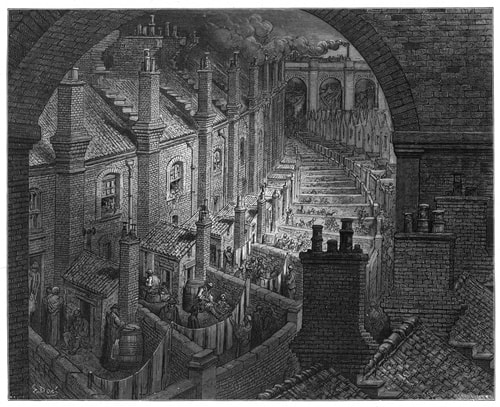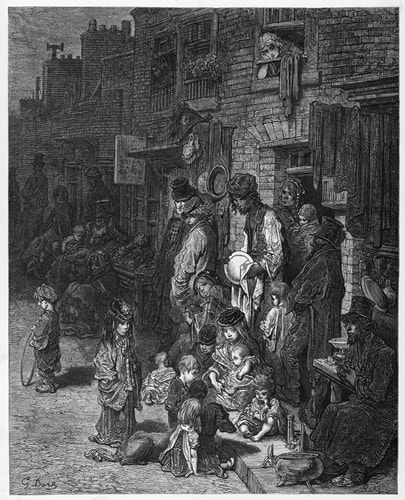|
CHAPTER THREE No doubt they made a curious pair to any onlooker: the somber physician and the gregarious bootblack. Davy Butler had spied him the moment he left the clinic and now tagged along at his side, whistling a tune. As usual, the boy’s face begged for soap and water. “How’s your leg this evening?” Alastair asked, noting Davy wasn’t limping as much as usual. “Right as rain,” the lad chirped. Alastair delivered a skeptical look. Davy would say anything to mollify him; it was the child’s nature. His mind skipped back to their first meeting––the twist of fate that had cost Alastair his future in Mayfair––Davy lying in the rain-soaked street, his right leg bent at an impossible angle while a carriage driver bellowed a torrent of abuse. Fighting back tears, the boy had insisted he couldn’t be hurt, that he had to work to feed his mum. In the end, Alastair ensured Davy’s widowed mother was fed and the rent paid. After a fortnight’s convalescence, the boy was on the streets again, hawking papers while leaning against a crutch. Once his leg healed, he returned to sweeping the streets, polishing boots and scavenging along the Thames during low tide for discarded items he could sell. To his credit, and Alastair’s supreme annoyance, he’d insisted on repaying every penny of the doctor’s generosity. “You sure your leg’s not troubling you?” Alastair probed. “It pains sometimes, but it’s not bad. Not like some I’ve seen. You did right by me, doc.” “Well, that’s good, then. How much did you make today?” “’Nuff for two days’ food,” Davy announced proudly. “Good job.” Alastair clapped the lad on the back. “How is your mother?” “Her cough’s worse,” Davy admitted. “She works too hard.” “Yes, she does. Have her come to the clinic tomorrow night.” “I’ll try, doc. You know how she is.” “Yes, I know.” Stubborn, like you. A smile bloomed on the boy’s face. “I’d best be goin’.” He tapped his cap. “G’night!” “See you tomorrow, Davy. My regards to your mother.” “Right, doc.” The boy scampered across the street and into an alley like a gazelle. The sight made Alastair smile. A success in a sea of failures. He paused to purchase a paper and then immediately thought better of it. Every penny counted. The clinic accepted what a patient could afford to pay, which was typically nothing. The cost of medicines, bandages and other supplies came from the pockets of the physicians and what pitifully few charitable donations they could raise. That evening, one of the children offered her dolly in recompense. Alastair had declined, a thick lump forming in his throat. It was clear the doll was all the child had to her name, other than a case of consumption that would carry her to the grave within the month. “Sir?” the newsboy asked. Alastair realized he’d been woolgathering. “No, I’ve changed my mind. Thank you.” He continued toward home, recalling when the cost of a paper was a trivial expense. Pausing outside the boarding house, he stared upward at the window of his room. A world away from his accommodations in Mayfair. “At least I’ll go to my grave knowing I made a difference,” he murmured. Knees and back complained as Alastair hiked the stairs to the second floor. The Wescombs’ interrogation still raged through his mind like a squall. Maybe now they’ve issued their warning, they’ll leave him alone. He unlocked his door and pushed it open with a faint creak. The room looked untouched, with his medical books and diary on the rickety table and his spare suit hanging on a hook near the door, airing. Delusions of persecution: one of the first indications that a Transitive was losing control. “Nonsense,” He shut the door and stripped off his coat. “Utter nonsense.” ~••~••~••~ He was too weary. The words would not come tonight, no matter how long he stared at the blank page. Sighing, he leafed back in the diary, savoring earlier entries. Friday, 31 August, 1888 Tonight, I tasted glory. It happened with minimal commotion, as if she knew her fate and was willing to grant my quest without struggle. When it was done, so aflame was I that I rushed headlong into the streets to proclaim my triumph. None understood. All things have a beginning. Tonight was mine. Flipping forward in the diary with a gloved hand, he read further. Thursday, 6 September, 1888 I detest funerals. They speak only to the living. Why would we, those who still draw breath, care of such things? I note the polished elm coffin was well regarded. Pity I could not claim credit for placing her within. My search continues. He closed the book and wrapped it in the fabric shroud, hiding it at the bottom of the wardrobe. Another time, the words would be there. ~••~••~••~ Cynda blinked her eyes, allowing them time to adjust. There was nothing quite like the darkness of a Victorian back alley. The pitch-blackness was augmented by the potent stench of far too many unwashed people and too few toilets, intermingled with the rank bouquet of rotting garbage. She fidgeted under the weight of her clothes. Though she’d opted for fewer petticoats than the Victorian norm to keep the burden under an oppressive twenty pounds, it was still a far cry from the feather-light stola she’d worn a short time before. As Ralph had once astutely observed, “Clothes are the measure of the time.” At the height of its glory, Pompeii was an exquisite city boasting ideal weather and three crops a year. At the height of the British Empire, London, at least the East End, was a festering dump. “Rule Britannia,” Cynda muttered, trudging down the alley. She carried a black Gladstone bag with a spare dress, toilet items and a substantial stock of chocolate packaged in appropriate Victorian-style wrappers. She didn’t plan on staying that long, but Overdues could be tricky. They tended to wander. Even though Whitechapel wasn’t that big—only about a square mile—there were a lot of holes to hide in if a tourist didn’t want to be found. She squeamishly gave a dead rat a wide berth. Those were never mentioned in TIC’s sales literature. Neither was the stark poverty of the East End, or the lack of adequate sanitation. Instead, the vid-brochures waxed poetic about the virtues of time travel. ‘Imagine standing in the cheering crowds as Queen Victoria celebrates her Golden Jubilee (1887) or conducting research elbow-to-elbow with Lenin in the British Library (1902). Be there as history happens!’ “What a crock.” Despite her misgivings, academic chrono-research was here to stay. One trip could deliver fodder for a decade’s worth of professional articles and Vid-Net interviews, exposure that led to tenure and fatter salaries. As the leader in time immersion technology, TIC was always eager to exploit history and make an unholy profit in the bargain. Until the last buyout. TIC had yet to regain its footing. Wage cuts ensued, then layoffs. Even Victorian London looked rosier than her employer’s future. Cynda paused at the entrance to the street to get her bearings. Despite all the chocolate she’d consumed before her departure, the mental fog remained. She blinked again, which only resulted in making the gas lamps appear multi-colored, like giant roman candles blazing into the grimy night. Every now and then, a bolt of lag-induced lightning would seem to strike the street in front of her, exploding in a burst of brilliant colors. The resulting thunderclap echoed like a thousand badly tuned cymbals. Her skin danced a two-step across her bones––all classic signs of advanced time lag. She was nearing the end of her reign as a Time Rover. Desk duty beckoned. “Not a chance,” she said, shaking her head vigorously. She resisted the temptation to rummage in the Gladstone bag for more chocolate. If Ivan the Infant were on the ball, she’d be near the boarding house. Once she’d checked in, she’d track the missing academic and line him up to go home. Finding Professor Turner shouldn’t be difficult; Cynda was one of the best trackers in the business. She’d start with the closest pubs, and if that failed, then the brothels. Protected for a time from the local diseases and safely beyond the scrutiny of their spouses, the academics ran wild. If Turner wasn’t conducting research of a horizontal nature or drinking his weight in cheap booze, she’d head for the British Library. That was always her last resort. A couple stumbled along, their off-key singing augmented by the level of cheap gin in their bellies. A bobby watched from the other side of the street with a benign expression. That puzzled her; she couldn’t remember a cop there in the past. Navigating around piles of trampled horse manure, she hiked toward the boarding house. As men passed, a few politely tipped their hats in respect. She found that unnecessarily quaint. A carriage sailed by, the clip-clop of the horse’s hooves echoing in the narrow street. She passed a stable and then, a bit further on, a pub going full tilt. Frowsy, middle-aged women stood outside, gossiping. When an unaccompanied male wandered within range, their antennae went up like a praying mantis scouting its next meal. “Hello, luv,” one of them called. The man sped up, his work boots slapping against the cobblestones as he hurried by. Apparently, he wasn’t interested in what she was offering. Cynda trudged on until she reached her destination: a nondescript structure on New Castle Street. A. Phillip’s Boarding House. A Warm Welcome and a Soft Bed, the sign read. The bed sounded good. Maybe I’ll sleep for a week and then find Turner. She mulled the idea and then shook her head. Not here. Anywhere but here. Sweating from the exertion and the weighty clothes, Cynda hauled herself up the stairs and gave a quick knock. A twinge of unease caused her to glance over her shoulder. In the dim gaslight, she thought she saw a man watching her from the other side of the street. When the door opened, Cynda swung around. Her balance faltered and she steadied herself on the door jam, the Gladstone banging into her knee. “Yes, miss?” a woman asked in a less-than-friendly tone. She appeared to be about fifty years of age, with graying hair and a doughy complexion. Her breasts were a continent all their own. She wasn’t Annabelle, the boarding house’s owner. Momentarily disconcerted, Cynda blurted, “I’m looking for a room.” The woman gave her the once-over and then frowned, hands moving to her hips. “Mind you, we don’t rent to those who ply the trade . . . or those who drink too much.” It took a moment for Cynda to understand what she meant. “Oh, no, I’m not . . . I’ve stayed here before. Miss Annabelle knows me. I’m Jacynda Lassiter.” A look of chagrin. “Oh, I’m sorry, Miss. Annabelle’s spoken of you. Come in, come in. You walked here alone?” the woman asked, surveying the street. Before Cynda could reply, she added, “Not safe for a young lady anymore. Come on, I’ll take you to my sister.” What’s up with Annabelle? Cynda took another look over her shoulder. The man was gone. Probably another lag-induced hallucination. She heaved a sigh of relief and hoisted herself over the threshold. The door closed behind her with a reassuring thud. The nearest wall provided needed support as she followed the heavyset woman toward the back of the building. “I’m Mildred, by the way. Annabelle’s had a bit of an accident. Hurt her foot a few days back. I’m here to help her.” “Good to hear it,” Cynda said, and then winced. That sounded less than sympathetic. Fortunately, Mildred didn’t appear to notice. Annabelle Phillips sat close to the warm stove, one leg propped on the seat of a chair. She always had a reedy look to her, as if she were hollow and with a slight draft of wind might play a tune. Kneeling next to her, examining the swollen ankle, was a young man with rolled-up shirtsleeves. He glanced upward at Cynda, his eyes an exhausted brown. A frown creased his face and she returned it. He wasn’t Professor Turner, the wayward academic. That would have been too easy. As Cynda opened her mouth to ask about accommodations, four scintillating lightning bolts set the kitchen in motion like a child’s toy. Sparkly-blue dots morphed into steel-gray ones. Right before the gray faded into black oblivion, She staggered into the young man, her knees giving way. “Need chocolate . . . ” she whispered, and then fainted at the startled man’s feet. Sojourn Time Rovers Book 1 Copyright ©2006 Jana Oliver Cover image courtesy of Yocla Designs All rights reserved. No part of this book may be reproduced or transmitted in any form or by any means now known or hereinafter invented, electronic or mechanical, including but not limited to photocopying, recording, or by an information storage and retrieval system, without the written permission of the Publisher, except where permitted by law. Comments are closed.
|
Jana Oliveris an international & multi award-winning author in various genres including young adult, urban fantasy and paranormal romance. Archives
November 2023
Categories
All
|




 RSS Feed
RSS Feed